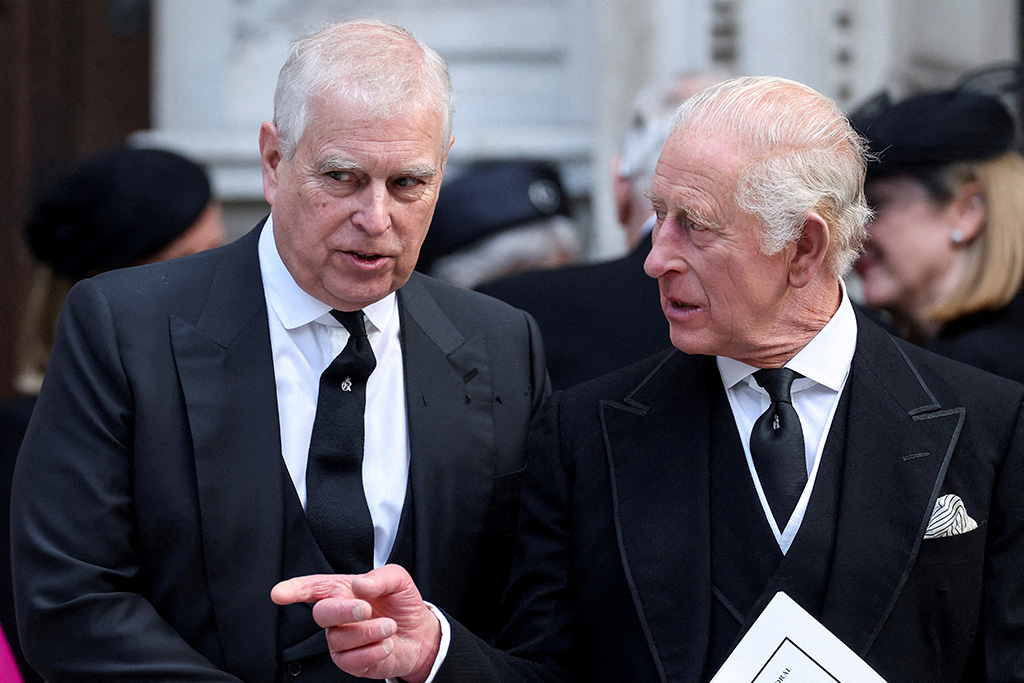He’s no longer prince, but it’s bit tougher to take away his position in the line of succession
Last Thursday Britain’s King Charles III initiated the process by which he will deprive his brother of all titles including that of prince. Henceforth he will be known as plain Andrew Mountbatten Windsor.
As the process involves the exercise of prerogative power by letters patent, it will be authenticated by the royal seal and be open and accessible to the public, rather like public general legislation.
Apparently, there was discussion between Buckingham Palace and the prime minister’s office about whether the deprivation of his title should be done under the royal prerogative or by legislation. The legal advice was that legislation was unnecessary as it involved the exercise of the royal prerogative by the king personally.
Andrew was of course born a prince by his birth to the sovereign – the late Queen Elizabeth II. In 1917 King George V limited the title prince/princess and the style Royal Highness to the children of the sovereign, the children of the sovereign’s sons, and the eldest son of the eldest son of the Prince of Wales. This was extended by Queen Elizabeth II to include the daughters and male line granddaughters of the sovereign.
Apparently, George V was so concerned about the royal family’s German origins during World War I, he also anglicised the royal family’s surname from the “House of Saxe-Coburg and Gotha” to the “House of Windsor”.
Another British German aristocrat who changed his German surname during WWI was Prince Louis of Battenberg, who changed his name and title to Lord Louis Alexander Mountbatten. He was the father of Lord Louis Mountbatten and Princess Alice of Battenberg who married Prince Andrew of Greece – the mother and father of Prince Philip.
On marrying Princess Elizabeth, Philip adopted the surname Mountbatten. So on being stripped of his princely status Andrew, the son of Philip Mountbatten and Elizabeth Windsor, became Andrew Mountbatten Windsor which actually sounds more posh than plain Prince Andrew — only joking!
Deprivation of the title of prince is not new. By a law passed in 1917 during World War I, it became possible to deprive British princes fighting for Germany against Britain. However, the alleged fighting for the enemy had to be investigated by the privy council comprising at least two law lords and proved to the satisfaction of parliament before the king could deprive them of their title as British princes – three British princes were deprived of their title under the 1917 law.
The problem Andrew faces is that he cannot really complain that the allegation against him of having sex with an underage girl was not investigated fairly because he chose to put his case to the British public directly in an interview with BBC Newsnight’s Emily Maitlis in 2019.
During that interview he came up with an alibi that he was with his children at a Pizza Hut restaurant on the day many years earlier and not at a nightclub with the late Virginia Roberts Giuffre, the underage girl with whom he is alleged to have had sex.
He also claimed that the allegation that he danced with Virginia and sweated profusely as she had claimed, could not be true because he stopped sweating for a while after he was shot at in the Falklands war in 1982 – the condition he described is known as anhidrosis which means ‘without perspiration’.
His Pizza Hut alibi and his claim he could not sweat were implausible, but not demonstrably false. What was demonstrably false was his claim that his association with the convicted paedophile Jeffrey Epstein definitely ended when the picture showing them having a walk in central park in December 2010.
Unfortunately for Andrew, his claim was contradicted by an email that surfaced in 2025 from his official email address to Epstein dated February 28, 2011 in which Andrew says “it would seem we are in this together and will have to rise above it …keep in close touch and we’ll play some more soon!!!!” signed as “HRH The Duke of York KG”.
Lawyers and judges will tell you that people lie for many reasons, and it does not follow that a person is guilty of an offence just because he is proved to have lied about something in the past. It is only if a lie was deliberate and about a significant issue that it is probative of guilt.
In the case of Andrew, the email proves he lied about his involvement with Epstein who allegedly procured Virginia for him to have sex with when she was underage and that their relationship was much closer than he had suggested. The content of the email is damning too: what on earth did he mean “we are in this together … and keep in close touch and we’ll play some more soon”?
It was that kind of evidence that drove King Charles to conclude that deprivation of his status as a prince was “deemed necessary, notwithstanding the fact that he continues to deny the allegations against him” and that their majesties “thoughts and utmost sympathies have been, and will remain with, the victims and survivors of any and all forms of abuse”.
The interesting thing about constitutional monarchy in the UK is that royal power is concerned with matters of style but not real political power which is done by government and parliament.
That is why depriving Andrew of the title of prince is an exercise of the king’s prerogative to grant and take away titles and styles, but depriving him of his birthright as eighth in the line of succession would require legislation in the UK and the approval of the Commonwealth.
Alper Ali Riza is a king’s counsel in the UK and a retired part time judge






Click here to change your cookie preferences